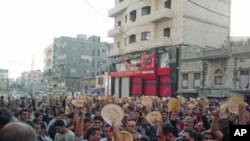For seven weeks, protesters have taken to the streets across Syria, demanding reform and calling for the ouster of President Bashar al-Assad. The government has reacted harshly, opening fire on protesters - allegedly killing dozens of them - and arresting hundreds of people. Analysts say the challenge to the Syrian regime could have a serious ripple effect in the region, particularly in Lebanon and Iran.
Syria's influence is perhaps felt the strongest in Lebanon, where the two countries have had a sometimes rocky relationship. But Beirut has been notably silent since Damascus started cracking down on protesters.
Recently, Lebanon, with support from Russia and China, led the way at the United Nations in blocking a response from the U.N. Security Council that would have condemned the violence and called for an investigation.
Human Rights Watch Beirut director Nadim Houry said that was a disappointment. "When Lebanon, because they have a seat at the Security Council, played a key role on the Libya resolution, and yet, sort of completely neutralized and mum on what is going on Syria. So it is very disappointing. At the same time, it is not surprising when you know the level of influence the Syrians still have in Lebanon. This is why it is important other Arab countries as well speak up," Houry states.
But Lebanon has its own problems. It has been without a government since January, and there is no sign the stalemate to form a new one will break soon. The group tasked with forming the cabinet is loyal to Syria, while the new opposition is pro-Western.
Syria has accused these pro-Western elements, specifically the Future Movement of caretaker Prime Minister Saad Hariri, of having funded and armed anti-government protesters in Syria. Senior Hariri adviser Mohammad Chattah says those accusations are ridiculous.
"Frankly, this accusation does not stand either the test of logic or evidence. Of course, we denied that flat out. I don't believe many people bought this," Chattah said. He adds that Lebanon has been careful not to be drawn into Syria's internal problems or to be seen as meddling. "Admittedly, the Syrian regime has difficult choices before it. We try to, as much as we can, distance ourselves from what is happening. Not because we are not interested - we are very interested - but because we want to avoid any hint of Lebanon meddling in Syria's affairs," he said.
One cannot explore Lebanon's relationship with Syria without touching on Hezbollah, the militant group and political movement based there. Hezbollah and its allies are now the majority in parliament and were the kingmakers in choosing the new prime minister.
American University in Beirut political science professor Hilal Khashan says Hezbollah is watching events in Syria very closely. "Hezbollah's heart and mind are in Iran. Hezbollah's lung is in Syria. Because Syria is Hezbollah's lifeline. Ideologically the Syrian regime and Hezbollah are incompatible. This is a wedding of necessity, not choice. The two sides need each other. Hezbollah needs the Syrian regime to survive," Khashan said.
Since 2006, Lebanon's southern coast has been patrolled by U.N. peacekeepers and the country's airspace is closely monitored by neighboring Israel, so Professor Khashan says it is only over land through Syria that Hezbollah is able to smuggle arms and ammunition. If that lifeline is cut, it will be a big blow to the organization.
Hezbollah's other patron, Iran, could also be negatively impacted by events in Syria. Lebanese American University Political Science Professor Imad Salamey says if Syria is weakened, then Iran will be too.
"Syria is of very important strategic significance to Iran, whether in exerting pressure on Israel and making any Israeli move against Iran a significant retaliation impact, or whether the Iranian-Syrian alliance has been impacting the political map in Iraq and in Lebanon. So the Syrian-Iranian alliance has many significant strategic importances in the region and that reflects on the relative power position of Iran. If Syria is weakened, that means Iran's position in the region will be weakened as well," Salamey states.
While Lebanon, Hezbollah and Iran stand to be most directly affected by events in Syria, Rami Khoury, who chairs the Issam Fares Institute of Public Policy at AUB, warns that regime change or extended internal problems in Syria could spill across the broader Middle East.
"The fact that Syria is politically and strategically and diplomatically linked with, and operationally active with, every single major player in this region - means that if something big happens in Syria then it ripples all across the region. Because they have ties with Iran, with Hezbollah, with the Lebanese government, with Hamas, Turkey, Iraq, Saudi Arabia, Jordan, on-and-off with Israel. The linkages are so enormous that the ripple effect would be just huge," Khoury said.
Khoury and others says many governments are afraid to find out what exactly that effect might be and are hoping the situation in Syria will simply calm down.
Analysts: Fallout of Syrian Violence Ripples in Lebanon




